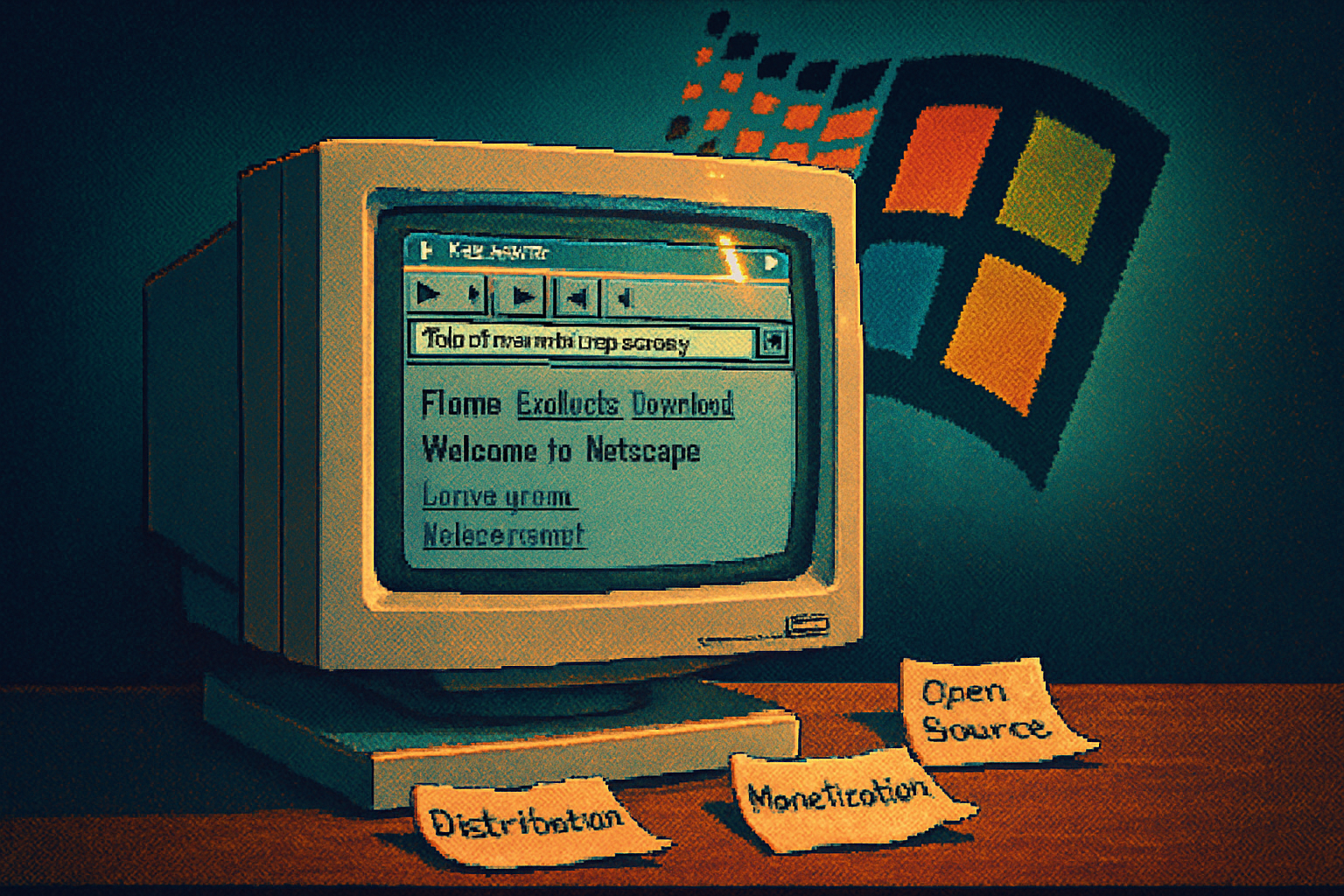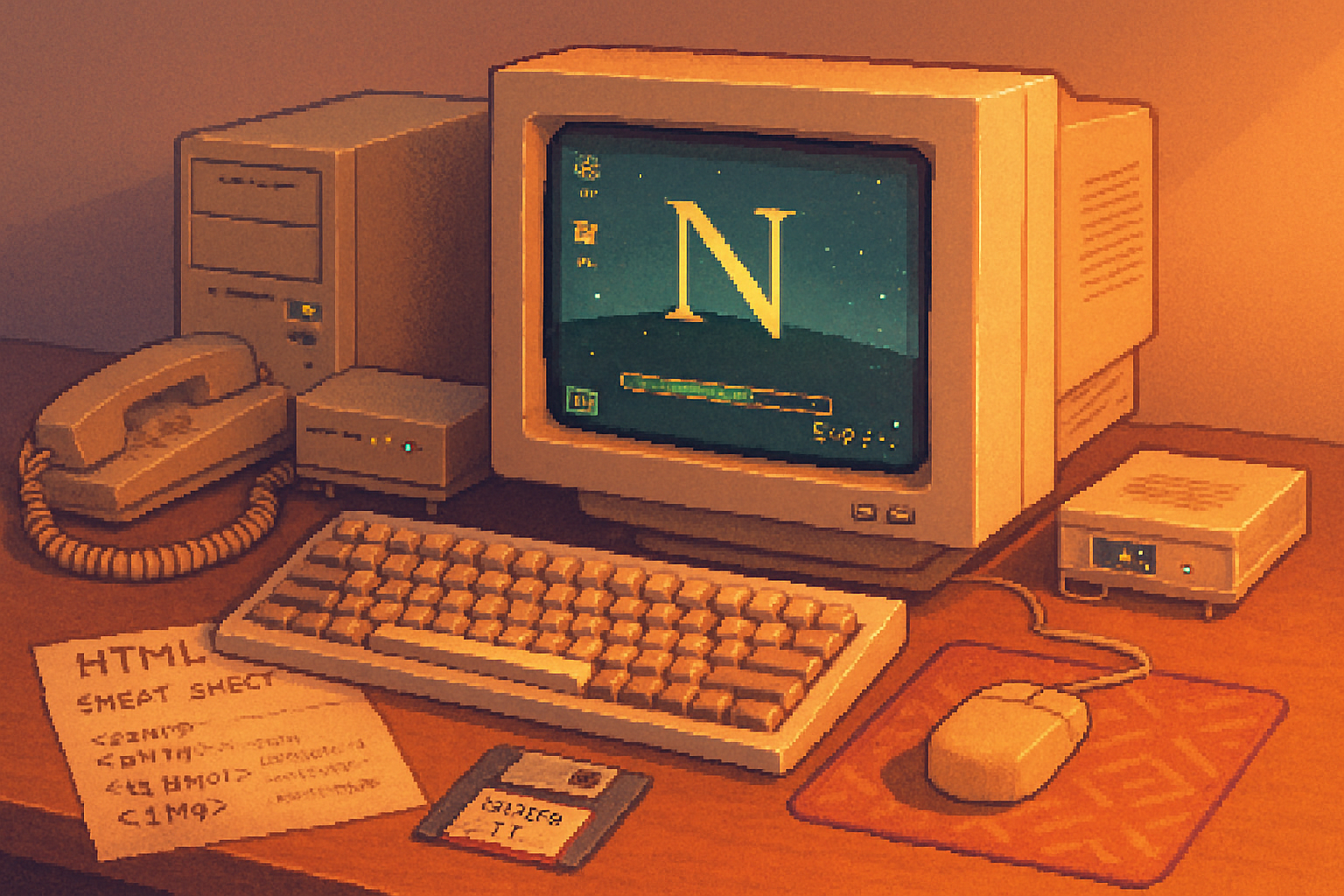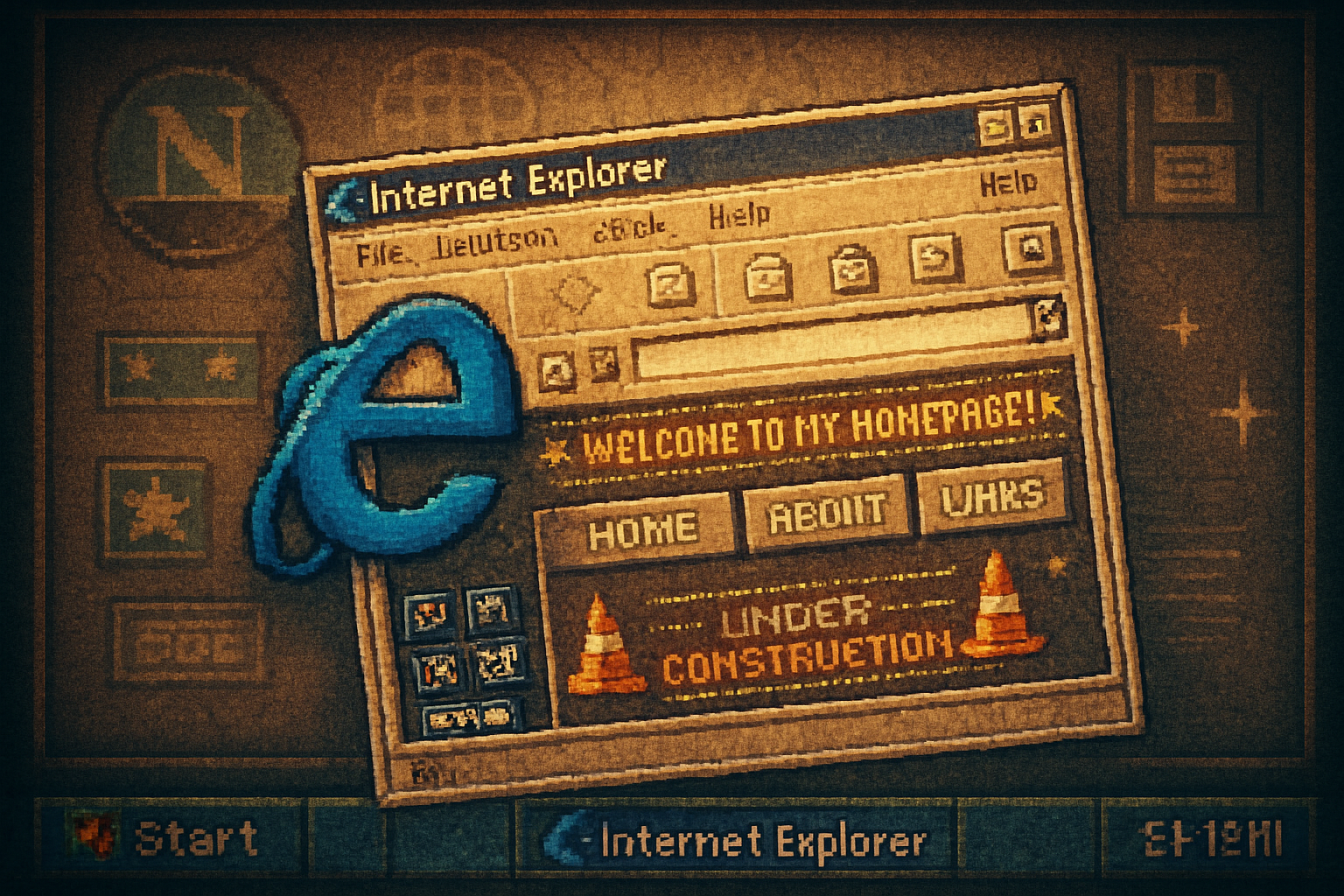· retrotech · 6 min read
Netscape Navigator: The Forgotten Browser That Changed the Internet Forever
Netscape Navigator wasn't merely a browser - it invented many of the protocols, languages, and commercial instincts that made the web what it is today. This post revisits its rise, fall, and the durable lessons every web developer should learn.

It began with a little gold “N” on a grainy CRT in 1994. Students would gather in computer labs and, with exaggerated solemnity, open a window that felt like a glimpse into the future. The web was clunky. Netscape made it feel not just possible, but pleasurable.
That pleasure mattered. It lured users who’d otherwise have stayed in command‑line obscurity. It coaxed businesses to put catalogs online. And, crucially, it shaped the conventions and technologies that still underpin the web.
The short, dramatic arc: boom, dominance, and a bruising decline
- Netscape Communications Corporation shipped Navigator in late 1994. It quickly became the consumer face of the web, capturing a majority of browser users within a couple of years see timeline.
- The company invented or popularized a string of innovations - cookies, JavaScript, SSL - that baked the web’s interactivity and commerce into reality (HTTP cookies, JavaScript, SSL).
- Then Microsoft bundled Internet Explorer into Windows, began an attritional “browser war,” and the market tipped. Netscape’s market share collapsed; it was bought by AOL and eventually open‑sourced as the Mozilla project (Browser wars, AOL acquisition).
History is mercilessly short on mercy. But the story isn’t just about corporate defeat; it’s about institutional and technical legacies that still matter.
What Netscape actually did - the inventions and their aftershocks
Netscape wasn’t just a pretty UI. It shipped a suite of ideas that altered the web’s DNA.
- JavaScript - Created in 1995 by Brendan Eich at Netscape, JavaScript turned static pages into dynamic apps and seeded an ecosystem that now runs servers, desktops, and phones (
- Cookies - Lou Montulli and team introduced cookies to allow stateful interactions on the stateless HTTP. This is the small technology behind shopping carts, logins, and, later, an entire advertising economy (
- SSL/TLS - Netscape developed Secure Sockets Layer to protect the fledgling online commerce industry. SSL made it plausible - and safe enough - to send credit card numbers over the web (
- Developer-first features - Plug‑ins, frames, and early DOM ideas made browsers an extensible platform and attracted both hobbyist and corporate developers.
Concrete example: you type a password into a site and hit enter. That convenience - a secure connection, a client script validating input, a cookie keeping you logged in - is an ordinary life-hack that traces directly back to Netscape’s early engineering choices.
The mistakes that accelerated the fall
Netscape’s innovations mattered. But innovation alone doesn’t guarantee survival.
- Platform complacency - Netscape assumed the browser would remain a separately distributed app. Microsoft did not. By bundling Internet Explorer into Windows, Microsoft converted distribution into an OS-level advantage, and the inertia of Windows won users.
- Technical divergence - Rapid feature additions and proprietary extensions helped Netscape grow but made the web fragmentation worse. Fragmentation invited Microsoft to focus on compatibility with Windows rather than web standards.
- Business missteps - Overemphasis on short-term monetization and a failure to build an unassailable developer ecosystem left Netscape vulnerable.
The net effect: a technologically pioneering product that lost the strategic war for the platform.
The open-source salvation and the Mozilla legacy
In 1998 Netscape made an audacious decision: release the source as Mozilla. That move saved many ideas. Mozilla evolved into the Firefox browser and into an organization - the Mozilla Foundation - that has pushed web standards and privacy messaging ever since (Mozilla history).
So Netscape didn’t vanish. It morphed, seeded a culture of open source on the client, and indirectly disciplined dominant vendors toward standards.
Netscape’s real legacy: three durable technical truths
- The browser is the universal runtime. Netscape treated the browser as the platform for applications - a prediction that proved prescient. Today’s web apps, PWAs, and the attention given to Chromium show how right they were.
- Standards matter, even when ignored. When vendors diverge, the web fractures. Netscape’s innovations forced the industry (and standards bodies) to react. The result was a long, often painful course toward interoperable standards (W3C).
- Security and privacy are product concerns, not afterthoughts. Netscape built SSL and embedded cookies; those choices created commerce but also new threats. Modern debates about tracking, TLS enforcement, and SameSite cookies are continuations of decisions made in the 1990s.
Lessons for today’s web developers and architects
Netscape’s story reads like a manual for what to do - and what to avoid - when you’re building the next infrastructure layer.
- Prioritize platform thinking - If you build a developer-facing tool, focus on distribution and platform control. Platforms are won or lost on default behavior.
- Invest in standards early - Interop buys you reach. Extensive vendor extensions buy you short-term market share and long-term maintenance agony.
- Treat security as baseline UX - If shipping a feature weakens user trust, it’s not a feature - it’s a liability.
- Build ecosystems, not walled gardens - Developers decide winners more often than marketers. A vibrant tooling ecosystem is defensible in ways a single-company feature set is not.
- Open source smartly - Open-sourcing attracts contributors - but only if governance and build processes are credible. Netscape’s open-source pivot worked only slowly and imperfectly.
A few contemporary parallels (and why they matter)
- Chrome/Chromium vs the open web - Google’s Chromium engine has consolidated a lot of market share - a reminder that control of the rendering engine still equals huge influence. The risk Netscape faced is the one we still debate today: centralization vs. decentralization.
- Platform bundling - Apple, Google and Microsoft still use OS-level distribution advantages. The tactic is older than Windows‑95 era bundling; it’s a playbook.
- Language evolution - JavaScript went from a quick scripting hack to the lingua franca of the web. The lesson: small pragmatic bets on languages can compound into platform dominance.
What we got wrong - and what Netscape got wrong - about the web
We once believed the web would be a neutral space where standards alone guaranteed fairness. That was naïve. Economic incentives, platform control, and distribution mechanics matter more than idealist standards-until standards organizations are strong, enforced, and supported by multiple large vendors.
Netscape thought a win in engineering and early market lead would be enough. It wasn’t.
Final verdict (sharp, but fair)
Netscape Navigator is not merely a nostalgia object with rainbow gradients and 56k memories. It’s an origin myth with teeth. It gave the web scripting, commerce, and the security primitives that made modern usage tolerable and useful. It also gave us a cautionary tale about platform strategy and the politics of distribution.
If you’re building web platforms today-whether a new client runtime, a developer SDK, or a privacy-first product-read Netscape’s rise and fall like you would a manual: cherish the technical boldness, replicate the ecosystem focus, and avoid assuming distribution will remain neutral.
The browser that once sat proudly on millions of desktops taught the internet three lessons: invent boldly, secure early, and never confuse a market lead for a lasting moat.
References
- Netscape Navigator - Wikipedia: https://en.wikipedia.org/wiki/Netscape_Navigator
- Browser wars - Wikipedia: https://en.wikipedia.org/wiki/Browser_wars
- JavaScript - Wikipedia (history, Brendan Eich): https://en.wikipedia.org/wiki/JavaScript
- HTTP cookie - Wikipedia (Lou Montulli, Netscape): https://en.wikipedia.org/wiki/HTTP_cookie
- Secure Sockets Layer - Wikipedia: https://en.wikipedia.org/wiki/Secure_Sockets_Layer
- Netscape / AOL acquisition - Wikipedia: https://en.wikipedia.org/wiki/Netscape#Acquisition_by_AOL
- Mozilla history - Mozilla Foundation: https://www.mozilla.org/en-US/about/history/



